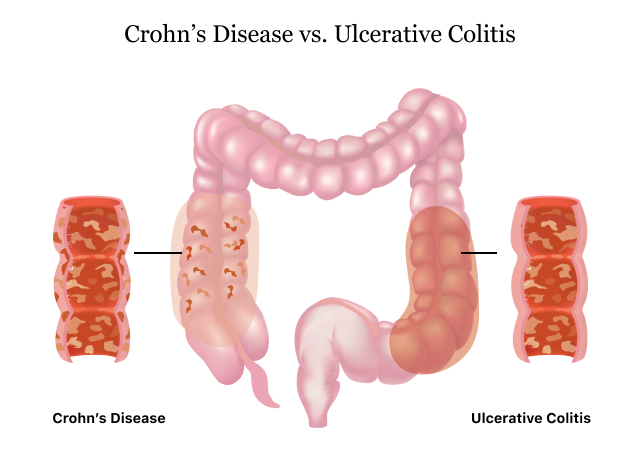Inflammatory Bowel Diseases - online presentation Individuals who suffer from Inflammatory Bowel Diseases (IBD) are confronted with an array of physical, emotional, and psychological challenges every day. The two most common types of IBD are Crohn's Disease and Ulcerative Colitis, both of which can lead to chronic inflammation and damage to the digestive tract. In order to manage the symptoms of IBD and improve overall health, it is necessary to adopt a comprehensive treatment plan that includes both medication and lifestyle changes. One of the most important lifestyle modifications for individuals with IBD is to adopt a healthy, nutrient-rich diet that is low in fat and high in fiber. Foods that are high in fiber help to regulate bowel movements and promote overall digestive health. They also provide important nutrients that support the immune system and help to reduce inflammation. A diet that is low in fat is important because fat can be difficult to digest and can exacerbate symptoms of IBD. When planning a diet for IBD, it is important to avoid certain foods that may trigger symptoms or inflammation. These may include dairy products, fried foods, spicy foods, and foods that are high in sugar. It is also important to avoid foods that are known to be irritating to the digestive tract such as raw vegetables and fruits with tough skins or seeds. To ensure a healthy, well-balanced diet, it is essential to include a wide variety of nutrient-dense foods. This may include lean proteins such as chicken, fish or tofu, whole grains like brown rice and quinoa, fresh fruits and vegetables, and healthy fats such as avocado and olive oil. To enhance the flavor of meals, it is important to use herbs and spices, instead of salt. Individuals with IBD may also find it beneficial to supplement their diet with vitamins and minerals. Some of the most important nutrients for people with IBD include vitamin D, calcium, and magnesium. These nutrients can help to promote healing in the digestive tract and support overall health. Crohn's Disease Diet Plan: Foods to Eat & Avoid and Tips Crohn's disease is a type of IBD that can cause inflammation and ulcers in any part of the digestive tract. While there is no cure for Crohn's disease, adopting a healthy diet can help to manage symptoms and prevent flare-ups. One of the best ways to manage Crohn's disease is to adopt a diet that is high in lean protein, low in fat, and low in fiber. Protein is essential for rebuilding and repairing tissue in the body, while a low-fat diet can help to reduce inflammation and improve overall digestive health. A low-fiber diet is important because it can help to reduce the frequency and severity of bowel movements. When planning a diet for Crohn's disease, it is important to avoid certain foods that may trigger symptoms or inflammation. These may include dairy products, fried foods, spicy foods, and foods that are high in sugar. It is also important to avoid foods that are known to be irritating to the digestive tract such as raw vegetables and fruits with tough skins or seeds. To ensure a well-balanced diet, it is essential to include a wide variety of nutrient-dense foods. This may include lean proteins such as chicken, fish or tofu, whole grains like brown rice and quinoa, fresh fruits and vegetables, and healthy fats such as avocado and olive oil. To enhance the flavor of meals, it is important to use herbs and spices, instead of salt. Individuals with Crohn's disease may also find it beneficial to supplement their diet with vitamins and minerals. Some of the most important nutrients for people with Crohn's disease include vitamin D, calcium, and magnesium. These nutrients can help to promote healing in the digestive tract and support overall health. In conclusion, managing IBD and Crohn's disease can be challenging, but adopting a healthy diet can help to improve overall health and prevent flare-ups. It is important to work with a healthcare provider to create a personalized nutrition plan that meets individual dietary needs and goals.
If you are searching about Crohn’s Disease Diet Plan: Foods To Eat & Avoid And Tips | Crohns you've came to the right place. We have 7 Images about Crohn’s Disease Diet Plan: Foods To Eat & Avoid And Tips | Crohns like Differences Between Crohn's and Colitis | Qu IBD, Crohn’s Disease Diet Plan: Foods To Eat & Avoid And Tips | Crohns and also 41 best images about med ed on Pinterest | Blood pressure, Medical. Here you go:
Crohn’s Disease Diet Plan: Foods To Eat & Avoid And Tips | Crohns
 www.pinterest.co.uk
www.pinterest.co.uk 10 Causes Of Hematochezia - Facty Health
 facty.com
facty.com colitis ulcerative anatomical ibd crohn vettore ulcerosa hematochezia beschriftetes infographic diagramm colite anatomico identificato facty seiner struktur diets spine sigmoid
Differences Between Crohn's And Colitis | Qu IBD
 www.quibd.com
www.quibd.com colitis ulcerative disease vs crohn between differences crohns bowel inflammatory common symptoms ibd uc diseases digestive both causes
Crohn's Disease & Ulcerative Colitis, Comparison - Stock Image C036
 www.sciencephoto.com
www.sciencephoto.com colitis crohn ulcerative
41 Best Images About Med Ed On Pinterest | Blood Pressure, Medical
 www.pinterest.com
www.pinterest.com colitis ulcerative crohn disease vs crohns nursing between syndrome nephritic choose board
Inflammatory Bowel Diseases - Online Presentation
 en.ppt-online.org
en.ppt-online.org colitis ulcerative crohn bowel inflammatory
Ulcerative Colitis | Causes, Symptoms, Types & Treatments
 www.drugwatch.com
www.drugwatch.com colitis ulcerative crohn types crohns digestive
Colitis ulcerative crohn disease vs crohns nursing between syndrome nephritic choose board. Colitis ulcerative disease vs crohn between differences crohns bowel inflammatory common symptoms ibd uc diseases digestive both causes. Colitis ulcerative crohn bowel inflammatory
 www.pinterest.co.uk
www.pinterest.co.uk  facty.com
facty.com  www.quibd.com
www.quibd.com  www.sciencephoto.com
www.sciencephoto.com  www.pinterest.com
www.pinterest.com  en.ppt-online.org
en.ppt-online.org  www.drugwatch.com
www.drugwatch.com
0 Response to "Crohn's Disease And Ulcerative Colitis Nutrition Therapy 41 Best Images About Med Ed On Pinterest"
Post a Comment